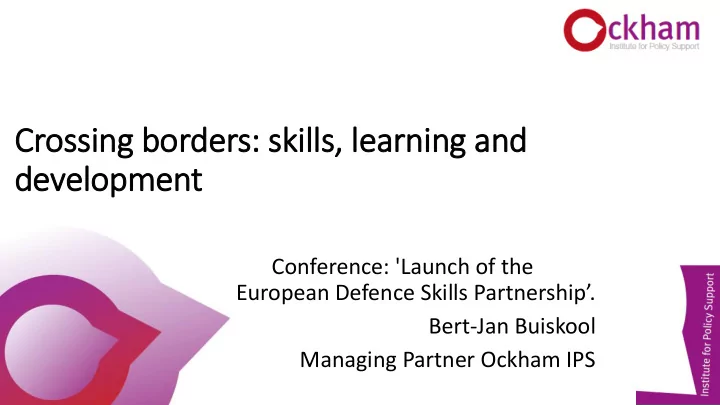

Crossing borders: skills, le learning and development Conference: 'Launch of the European Defence Skills Partnership’. Bert-Jan Buiskool Managing Partner Ockham IPS
Problem statement? Alarming messages! • know-how is eroding in many important industrial and technology areas of the defence sector • The number of experts, specialists, mechanics and scientists in the defence sector is shrinking dramatically • Engineers are predominantly middle-aged as the younger generation is less attracted to apply for engineering jobs in the defence industry and research institutes Source: European Défense agency: key skills and competences for defence
1. . The in increasing turnover of f knowledge requires rethinking education systems • Educational reform does not match the speed of change • Rethinking ‘traditional’ teaching towards integrating learning at the work floor • Critical factors for effective work-based learning : • Characteristic of the organisation • Workplace conditions • Personal characteristics of the learners Good practice: peer learning in the defence sector (using You Tube) (NL)
2. . Knowledge production and le learning in in in interaction wit ith the pri rivate sector, research, and training providers • Uncertainty and limited communication on equipment requirements makes it difficult to plan skills in the supplying defence industry • Increasing dependence on the private sector (development /maintenance of defence technology and equipment by private companies) • Increasing provision of learning in civil / private sector • Multidisciplinary challenges in defence, require multidisciplinary approaches • lack of a strategic approach to the management of skills across government, industry and the education sector Good practice: Defence Growth Partnership (UK); Finmeccanica’s Higher Technical Institutes (Italy)
3. . Facil ilitating la labour mobility and continuing le learning of f workers • High turnover of staff in defence • Recruitment challenges (image working for defence; competition with other industries; more visibility) • Upward mobility (capturing prior learning and working experience; use of e- portfolio etc.) • Flexible layer of specialists and increasing cooperation between uniformed professions • Outflow (accreditation of prior learning; civil effect; permeability and access to formal education) Good practice: Purple Partnership Defence and VET schools / One step (qualification) up / hybrid education trajects in the last 2 years (NL)
4. . Skills crossing border (b (between disciplines and countries) • Myriad of qualification frameworks , occupational standards and learning provision between countries (as well in related uniformed sectors) • Lack of transparency of capacities, making international cooperation / missions less effective (interoperability) • Cross border learning is hampered by language and recognition of training certificates across borders • Security and nationality considerations hinders development and cross- fertilisation of skills • Need for more peer learning and creative collisions between countries Good practice : NATO work on competence framework; Sectoral Qualification Framework (SQF) for all levels of Military Career (EC); classification of four defence training programmes in the NLQF / EQF (NL)
5. . Governing skills needs • Limited information on sector wide (changing) skills needs, hampering governance and strategic planning of skills at European level • Therefore, it is important to; • explore the existence of labour market intelligence data infrastructure • ensure that the information produced informs the policy making process and steers the educational offer • have clear institutional mechanisms in place and cooperation between stakeholders is paramount • Establish an implementation roadmap with policy actions, setting goals, and monitor implementation
To conclude: Need to work on partnership IQ IQ as well • Do you look to the future with a clear vision ? • Do you welcome change ? • Do you creatively resolve conflicts when they arise in your organisation? • Do you value interdependence more than independence? • Do you take every opportunity to create trust , both through words and actions? • Do you openly disclose information and offer feedback ? Source: Lekanne Deprez & Tissen, 2002
Thanks for your attention!
Recommend
More recommend